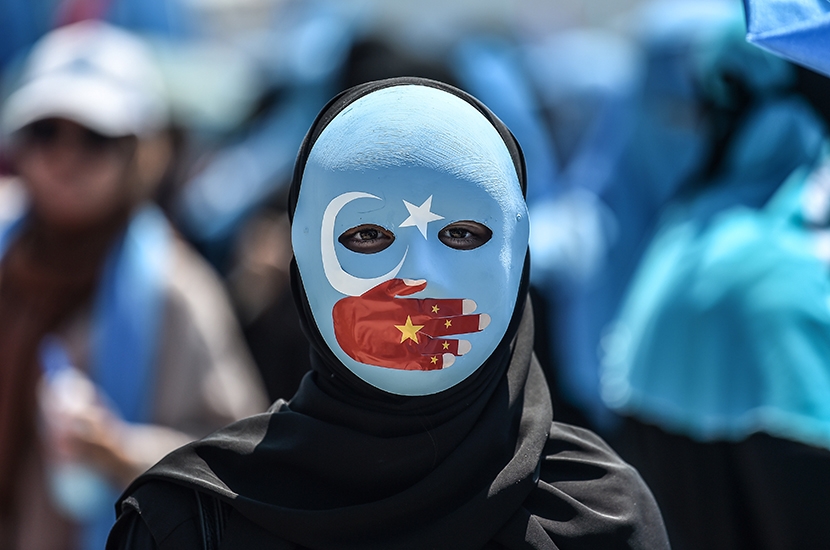Amannisa Abdullah was in the last weeks of her pregnancy when her husband, Ahmad Talip, was arrested in Dubai. ‘He was on his way to buy a dress for our unborn girl,’ she says. Ahmad, who had lived and worked in Dubai for nearlyten years, never arrived at the shop and his family have not seen him since. He was held at a local police station for several days and then was deported to China in 2018, where he is reportedly in prison. ‘He just disappeared. We don’t know where he is or what he is accused of,’ says Amannisa, who fled to Istanbul.
Ahmad is a Uighur Muslim. His story is not exceptional. Hundreds if not thousands of Uighurs, a severely persecuted minority from western China, have been detained in recent years in the Middle East and in Asian countries. Many of them are secretly deported to China, where they are incarcerated. These forced repatriations are part of China’s campaign against Muslim minorities which, according to the US government and human rights groups, amounts to ethnic genocide. More than a million Uighurs have been held in a vast system of re-educationcamps and prisons in the western Chinese region of Xinjiang. In the camps, Uighurs and other Muslim minorities such as Kazakhs are -indoctrinated and, in some cases, tortured. There are also reports of slave labour and forced sterilisation of women.
For decades, Muslim countries such as Egypt, Saudi Arabia and the United Arab Emirates had been safe havens for the Uighur diaspora. But as China’s economic might and global reach grow, governments around the world have started to push Uighurs out of their countries and assist China in its international manhunt.
Since 2017, several thousand Uighur students, workers and businessmen have fled Cairo after Egyptian authorities started a nationwide crackdown. ‘At Cairo airport they had lists with three colours. People with their name marked green could fly out, yellow names had to stay at the airport and red ones were arrested,’ says Abduweli Ayup, a Uighur activist based in Norway. In some cases, the Uighurs were questioned by Chinese police officers in their prison cells in Egypt before they were deported to China.

In the summer of 2017, 17-year-old Tahir Yusuf (his name has been changed for the protection of his family in China) and his younger brother, who had been sent to Egypt by their parents to study, managed to avoid capture and fled to Dubai. But a few months later, authorities in the UAE also cracked down on Uighurs. ‘At 4 a.m., police came to Tahir’s room and arrested him,’ says Ihsan Karkal, a friend who helped the brothers at the time. ‘Most probably, he is in China in a camp or in jail.’
A similar crackdown happened in Saudi Arabia, which provided asylum to Uighurs as early as the 1930s. During a state visit to Beijing in 2019, Saudi Crown Prince Mohammed bin Salman publicly supported China’s harsh policies in Xinjiang, despite the reports of mass internment camps there. At least four Uighurs have been arrested by Saudi police and deported to China while they were on pilgrimage to Mecca or living in the country. In the same year, more than a dozen Muslim-majority countries — including the UAE, Iran, Egypt and Saudi Arabia — publicly endorsed China’s policies in Xinjiang, helping China to fend off criticism at the United Nations. ‘These countries pride themselves for being leaders of the Islamic world, but they don’t bat an eyelid when returning people for persecution for being Muslim,’ Maya Wang of Human Rights Watch told CNN.
Countries that were once safe havens for Uighurs have started to push them out and assist the hunt
Beijing defends its harsh treatments of the Uighurs as a necessary policy against terrorism. But in reality, hundreds of thousands of Uighurs have been sent to re-education camps and to prisons for no other reason than their ethnicity. The Chinese Communist party issues quotas to the local authorities in Xinjiang for the number of people to put into camps. I’ve interviewed dozens of Uighur and ethnic Kazakh families and I’ve heard of cases where men and women were being sent to camps just because they had family members abroad. Some disappeared after they received telephone calls from friends overseas or because they had long beards, which are banned under China’s ‘anti-extremism’ regulations. Other Uighurs in the camps had been model citizens and even members of the CCP. ‘Some of the arrested Uighurs in Egypt were students who had been officially sent there by the local Chinese government,’ says Ayup. ‘How can a government first send young people abroad and then treat them as criminals?’
The forced repatriations are a frightening sign of China’s growing influence over foreign governments. Beijing is increasingly putting economic and political pressure on countries to cooperate with its authoritarian police system. In 2015, Thailand sent 109 Uighurs back to China after they tried to escape from Xinjiang to Turkey via south-east Asia. The men and women were flown back in a special aeroplane with black hoods over their heads and guarded by policemen, according to Chinese TV reports. Cambodia, Malaysia and other Asian countries have carried out similar deportations.
Even in European countries, which do not extradite people to China, dissidents and members of China’s minorities do not feel safe from Beijing. Several Uighur families in Germany and other European countries told me that they receive warnings and even threats from Chinese authorities if they talk publicly about their family members in the re-education camps or report human rights violations. ‘They force your father or mother to call you and ask you to stop talking to the media, otherwise there would be bad consequences,’ explained one Uighur woman who now lives in Munich.
China is also using Interpol, the international police organisation based in Lyon, as a tool for forced repatriations and to silence critical voices. Dolkun Isa, the president of World Uighur Congress, an international organisation of exiled -Uighur groups, was the subject of an Interpol ‘red notice’ — an international wanted–person alert — for 21 years. China never provided any proof or explanation. ‘The space for Uighurs in the world is getting smaller, because China is putting more and more pressure on other countries,’ says Isa.
How far will Beijing go to expand the reach of its regime? Last year, when China imposed its controversial national security law on Hong Kong and basically ended free speech in the former British colony, the law included extraterritorial jurisdiction for the first time. The 38th article of the text states that the law applies to offences committed against Hong Kong ‘from outside the region by a person who is not a permanent resident of the region’. In other words, people outside Hong Kong, who might never have been to the city, can in theory be persecuted.
In recent years, Chinese secret agents have been kidnapping dissidents and business people in several Asian countries. In 2017, the Chinese-Canadian billionaire Xiao Jianhua was drugged and rolled out of the Hong Kong Four Seasons Hotel in a wheelchair before being ferried back to China in a boat. The book publisher Gui Minhai, a Swedish citizen, was apparently kidnapped from his apartment in Thailand and was later given a ten-year prison sentence in China.
The kidnappings are part of Beijing’s ‘Operation Fox Hunt’, a global campaign to bring back targets from abroad. The campaign, which is officially directed against corrupt officials who have fled overseas, has repatriated more than 3,000 individuals, according to Chinese state media.
Uighurs are Turkic people, and until recently one of the few remaining safe countries for them in the Islamic world was Turkey, which shares a similar language and culture. Today around 50,000 Uighurs live there. But the government of President Recep Tayyip Erdogan, which used to defend the rights of Uighurs, has recently softened its rhetoric towards Beijing. Since the pandemic, Turkey’s government depends on vaccinations and economic aid from China. In 2017, both countries signed an extradition treaty — a ‘counterterrorism partnership’ — which was ratified at the end of last year by China and which could lead to Uighur deportations in the future.
After more than three years, Amannisa Abdullah still hopes to hear from her deported husband. Her youngest daughter, who was born in Turkey and has no passport, has never met her father. As Erdogan turns to China, will Amannisa’s new home remain safe for her and her two children? ‘All we wanted was to work hard and to live peacefully,’ says Amannisa. ‘But this seems to be impossible for us Uighurs.’






Comments